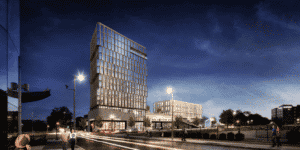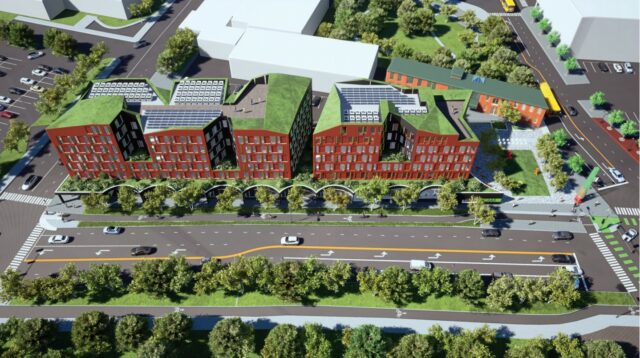
Three developers are vying for the chance to develop parcel 8 in Roxbury’s Nubian Square, including NuGateway’s proposal for a mixed-income housing tower, office space and a public market. Image courtesy of J. Garland
In a decade of commercial real estate success stories in Boston, the Roxbury neighborhood has lagged in attracting new employment hubs and projects that could transform long-vacant parcels.
A historic building boom added 7 million square feet of new office space in Boston between 2014 and 2019, but just 1 percent of the activity took place in Roxbury or Dorchester, according to Boston Planning & Development Agency data.
But undeterred by that track record, a new generation of developers is testing Roxbury’s potential to join in Boston’s recent building boom, as city officials seek to attract private investment without accelerating displacement. In Nubian Square, surplus public property sales have attracted proposals for office space, a public food market, cultural centers and multifamily housing.
“When we were first coming into the area looking at Roxbury as an investor and speaking with our lenders, there’s definitely interest, but there is some holdback,” said Angelo Drake, a partner at Boston-based developer Groma. “People believe it’s more difficult to work in the area. You have to engage deeply with the community to make an investment work.”
Groma, a development firm founded in late 2019, proposes a public food market and 100-unit mixed-income housing project on parcel 8, a Nubian Square development site owned by the city of Boston and state of Massachusetts. Two other development teams have submitted proposals for mixed-use projects including office space, housing and cultural centers.
Clearing Hurdles to Revitalization
Developers active in the neighborhood cite a variety of factors that have held back the area’s growth. Public transit relies heavily on bus service, in contrast to the rapid-transit connections that have attracted explosive growth in areas such as Boston Landing and North Station. Deep-pocketed for-profit developers hesitate to gamble on projects where substantial affordable housing requirements cut into returns, or require low-income tax credits that can take years to obtain from government housing agencies. And public safety concerns have discouraged some investors.
Milton Benjamin, a Boston developer and diversity consultant to the real estate industry, said bureaucracy associated with publicly-owned parcels and developers’ struggles to access capital have been recurring themes in Roxbury.
“When you step back away from how long it takes and the hurdles that are in the way of development progress in those communities, it’s incredible. I’ve watched this over multiple projects,” Benjamin said. “Are there concerns about whether developers can perform? Yes. But what we’ve seen is there are a number of individuals who are people of color and others who have considered joint ventures that should have been able to move the calendar forward.”
Kirk Sykes, an architect and developer who’s part of a team recently selected to redevelop the former Boston State Hospital property in Mattapan, said investors tend to be wary about emerging neighborhoods that typically feel the effects of economic downturns the soonest and recover from them last.
“Raising a private equity platform with some of the largest investors in the world, you know what the investors want to hear, and what they’re concerned about,” Sykes said. “You start with the market comps. How much of a cushion is there if you hit a down patch, and how are you going to get through that? Sponsorship is critical and always will be.”

A 102-unit building with and 10,000 square feet of commercial and arts space, proposed by Roxbury-based Urbanica, could rise on a city-owned parcel in Nubian Square. Image courtesy of Stephen Chung LLC
Bolling Building Was Just a Start
Transformative projects have been slow to gain traction in Roxbury, where some parcels acquired for a never-completed highway project have sat vacant since the 1970s. The neighborhood’s most-watched development site, the 7-acre parcel P3 at Tremont and Whittier streets, is on hold after the BPDA voted in October to remove the site’s designated developer since 2007.
Developers Feldco and Elma Lewis Partners had received approval for 727 housing units, a BJ’s Wholesale Club and a museum for the National Center of Afro American Artists, but ran into delays obtaining financing. BPDA officials said last fall the parcel would be put out to bid again in mid-2020. A BPDA spokeswoman said last week that no update on the disposition timeline is available.
The 2015 completion of the $125 million Bruce C. Bolling Municipal Building in Nubian Square for a new Boston Public Schools headquarters was a cornerstone of the city’s efforts to lure private investment to the neighborhood, bringing 500 school department employees to their new offices in a 215,000-square-foot office and retail building.
“Personally, I think it’s a beautiful building,” said Kamran Zahedi, president of Roxbury-based developer Urbanica. “The commercial space on the ground floor hasn’t been very successful because you really need more foot traffic and disposable income and safer neighborhoods, and the Bolling Building by itself can’t solve all the issues. You need all of these vacant lands to be developed and make some kind of connectivity in Nubian Square.”
Zahedi’s firm could play a part in making connections as one of the potential development teams for parcel 8. It’s proposing 102 housing units including 35 condos and 10,000 square feet of commercial and community space, including a satellite museum for the Roxbury-based National Center of Afro American Artists.
The development team selected a design for a 6-story wood-framed building over a podium after rejecting high-rise construction as unlikely to be profitable in the neighborhood, Zahedi said.
City Offers Trade-Off
Drake’s Groma team is more optimistic about the feasibility of a signature high-rise in Nubian Square, proposing a 14-story tower including a public market, two floors of office space and 100 apartments, 70 of which would be income-restricted for households. It’s offering $10.5 million for the property, but proposing that $3 million be reserved for grants to local community groups over the next 10 years.
The emergence of institutional sources of capital such as Goldman Sachs Asset Management in the environmental, social and government (ESG) category could spur more private investment in inner-city neighborhoods that have been neglected for decades, Drake said.
“A lot of groups look for lower returns but more purpose-driven development, so it’s trying to find the right partners to make projects like this work,” he said.

Steve Adams
Dispositions of the Nubian Square parcels are driven by the BPDA’s PLAN: Nubian Square, which placed a priority on approving developments that create jobs as well as housing. The trade-off: Developers could acquire parcels at below-market prices in exchange for enhanced community benefits.
Historic Boston Inc. is proposing to restore and expand the former Nawn Factory building in Nubian Square into a wellness center and cafe. The other respondent, Art @ The Nawn Factory, is seeking to add rehearsal and performance space for local arts groups that have been facing their own displacement pressures. Proponent Jonathan Smalls said the plan was inspired by the closure of Cambridge’s Green Street Studios and similar community arts spaces.
“It’s exciting to see more people having a stake in Nubian Square and investing money around one of the biggest transit hubs in the city,” Smalls said. “At the same time, I want to see the neighborhood retain more of its character and more minority representation in the ownership and occupancy of these properties.”




 |
| 
